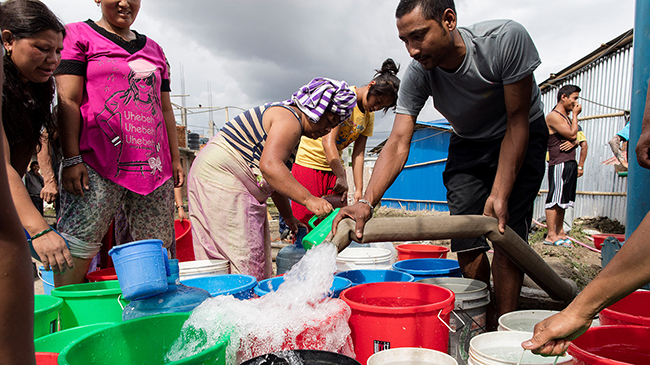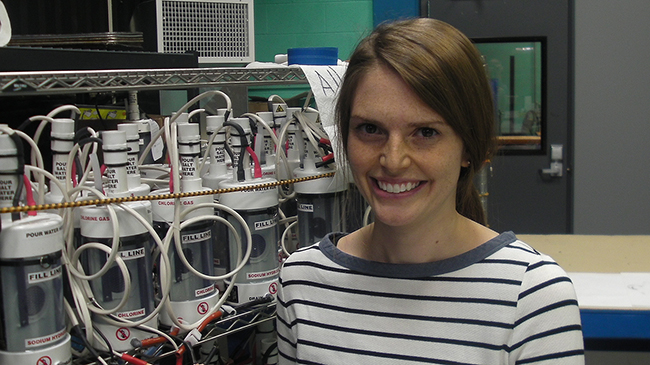By Steven Krolak
Emily Mathews is saving lives by studying business at IU Southeast.
Mathews received her B.S. in business (economics and management) at IU Southeast in 2013, and will graduate in December with an MBA. To fulfill the community service requirement in her program, she works pro bono at WaterStep, a Louisville, Ky.-based nonprofit enterprise that provides safe water solutions for disaster relief and poverty-stricken communities in the developing world. Considering that every 60 seconds, a child dies from an illness caused by unsafe water and/or poor sanitation, it’s fair to say that every time Mathews walks into WaterStep’s headquarters in a converted warehouse space in Louisville to share her business skills and expertise, she is helping to reduce infant mortality.
“It means a lot to be contributing to something like this,” Mathews said.

WaterStep brings portable and affordable safe water solutions to impoverished and disaster-stricken regions, such as Nepal and the Philippines. Photo courtesy of WaterStep.
Leveraging skills and expertise
The community service requirement is a unique feature of the IU Southeast MBA program. Graduate business students must perform at least 20 hours of community service in a project that involves their contribution in the form of business knowledge, leadership and or expertise. This is not mere volunteer work. “The students need to bring meaningful, substantive business skills to a designated 501c3 enterprise,” said Sharon Allen, director of graduate business programs.
Students choose their nonprofit partner, describe the scope of their involvement, identify whom they will be working with, and then submit a final report on what they have achieved. In 2015, IU Southeast MBA students have shared their skills in a wide variety of contexts.
–Tyler Green taught two 4th grade classes at Maryville Elementary School about the virtues of entrepreneurship.
–Paul Jurkiewicz helped low-income taxpayers and elderly individuals complete tax returns as part of the Volunteer Income Tax Assistance (VITA) program.
–MaryCrae Guild helped analyze volunteer data and develop funding request presentations for Metro United Way.
–Natasha Ben developed a budget for the Anchal Project, a Louisville, Ky.-based nonprofit that helps find alternative employment for women in Third World countries.
–Pallavi Biswas created a database of foundations to help the Louisville Soccer Alliance fund an indoor practice facility.
–Christy Keesee taught job search and interview skills at the Women’s Choice Resource Center and Necole’s Place in Louisville, Ky.
An inspired choice
Mathews was inspired to work for WaterStep after learning about the organization’s mission and values on an introductory tour. WaterStep was founded by Mark Hogg, a recipient of the 2014 Kentucky Humanitarian of the Year Award. WaterStep has worked in over 30 countries, bringing safe water to hundreds of thousands of people in Africa, Asia, South America and North America. The organization is headquartered in a reclaimed warehouse in Old Louisville. Bright blue walls announce the water theme, and flags from around the world signal the organization’s reach.
The pride of the firm is the M100 chlorinator, a sustainable water purification system that potentially provides 10,000 gallons of safe water per day at the cost of $1 per person per year, yet is small enough to fit inside a backpack, making it perfect for villages, schools, clinics, and other sites in the developing world.
More than a provider of low-tech hardware, WaterStep delivers knowledge. The organization trains volunteers in water treatment, health education and well repair. The latter is central to WaterStep’s mission. The group estimates that nearly half of the hand-pumps in Africa are broken, forcing residents to walk miles for water. After learning to repair wells – WaterStep is the only indoor well-repair training facility in the world – volunteers are ready to go out and have a direct impact on the lives of thousands of people worldwide.
As Mathews said, “One of the important things about the product they make here is that it’s not something that gives them clean water for a couple of weeks and goes away. It’s something that they actually keep in the area, and they teach people how to use it, so it’s more about learning than just handing something to someone.”
A tremendous help
Mathews’ community service focus has been to create and manage a single electronic inventory database to help the manufacturing team identify and track the component parts of the M100 chlorinator and other devices. This has involved consolidating various inventory spreadsheets, as well as inventory items from Quickbooks, into a single Excel spreadsheet. With a shifting set of volunteers, changes in the sourcing of materials and parts, and a proliferation of department-specific nicknames for beloved or often used components, keeping track of key pieces of the M100 puzzle can be a challenge. Mathews and fellow volunteer/supervisor Lynn Humphrey are also collaborating on a naming convention for all M100 parts, and are now moving on to numbering and labeling in the assembly area.
“Instead of the five or six names that a part might have now, there will be one name, and everyone will recognize it,” Mathews said. “Anyone can look at it and know what it is and what it is for.”
For Mathews, the project is related to her current job in procurement at Raytheon, a defense contractor. She is able to leverage those skills and the knowledge she has gained in the MBA program to make a meaningful contribution to a social enterprise whose mission she believes in.
“Emily has helped WaterStep tremendously,” said Humphreys. “Having an inventory will assist WaterStep in tracking, ordering and sourcing products.”

IU Southeast MBA student Emily Mathews has helped to design an electronic inventory database to help track parts for the M100 chlorinator.
Impact beyond a degree
Not surprisingly, Mathews would like to continue working with WaterStep after graduation. “There are a lot of skills that I have that are very beneficial to an organization like this,” she said, “and I would definitely like to continue helping them if and when they need it.”
This is not surprising, said Allen. “The minimum engagement is 20 hours, but once the students get involved, they often work many more hours, and some end up joining the boards or advisory boards of the organizations they had assisted as part of the requirement. Once you see the impact you can have, you want to help,” she said.
Among the many ancillary benefits of the program for students, both Allen and Mathews point to networking opportunities. Nonprofits are unique organizations in that they bring together diverse stakeholders for a common, socially beneficial purpose. For example, major local employers such as GE and Humana have contributed to the work of WaterStep. In these relationships, all parties learn more about one another, creating almost endless possibilities for collaboration.
“The community service requirement is a great way to show students that the skills and knowledge they are acquiring can go beyond a degree and a promotion,” said Mathews.
“It’s a way for IU Southeast to give back to the community, and also a way for the community to see what our students can bring to the table,” said Allen.


